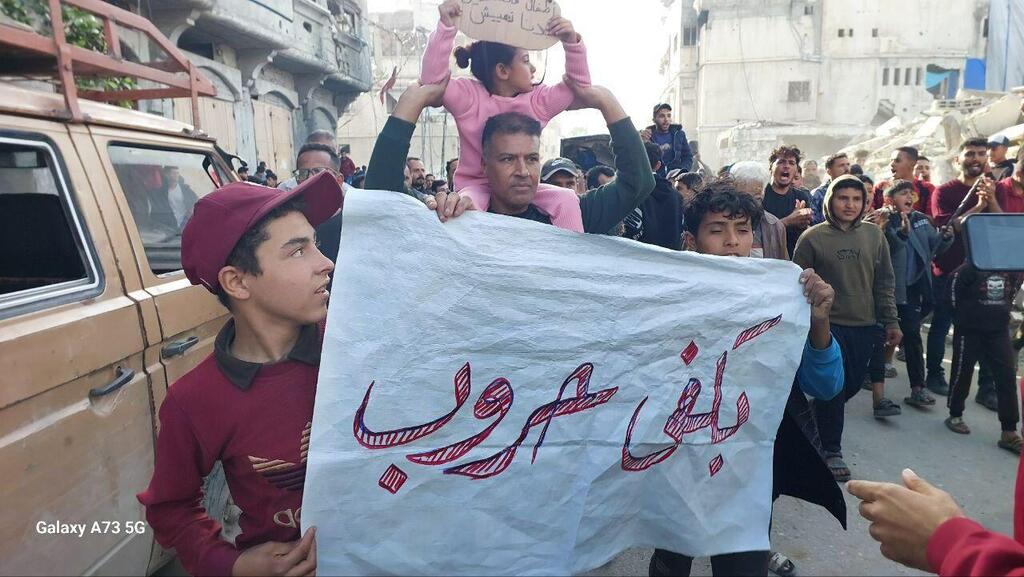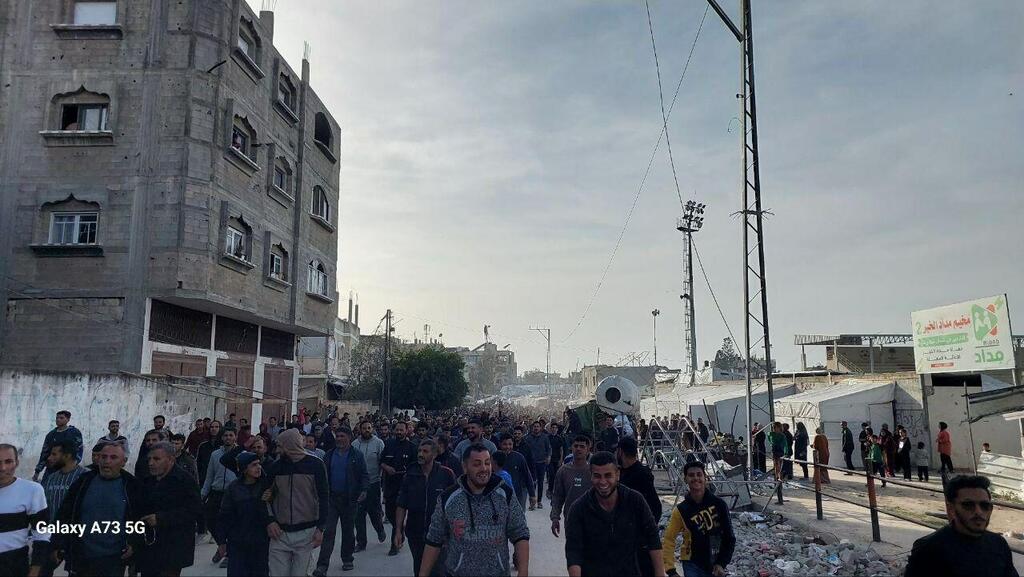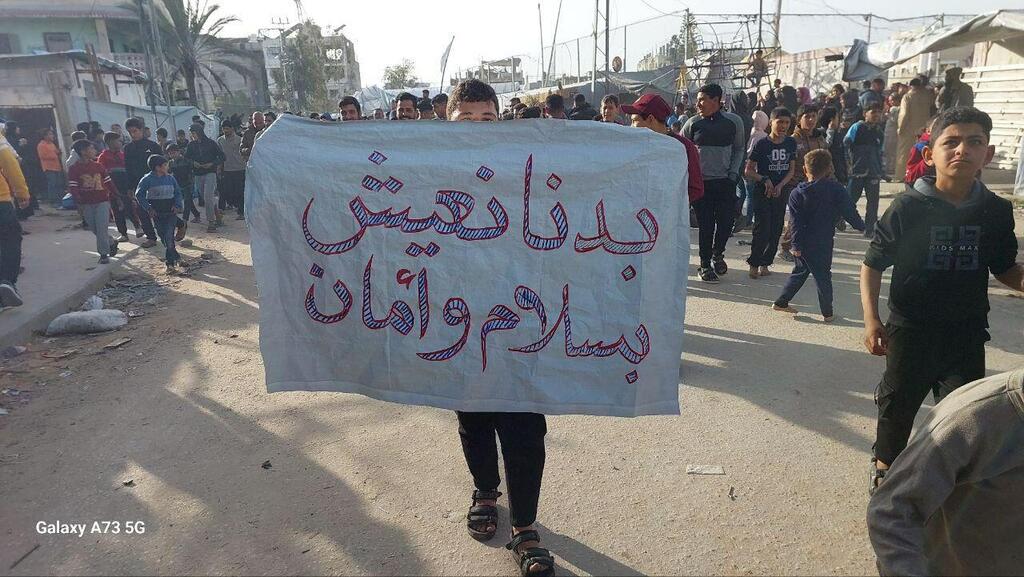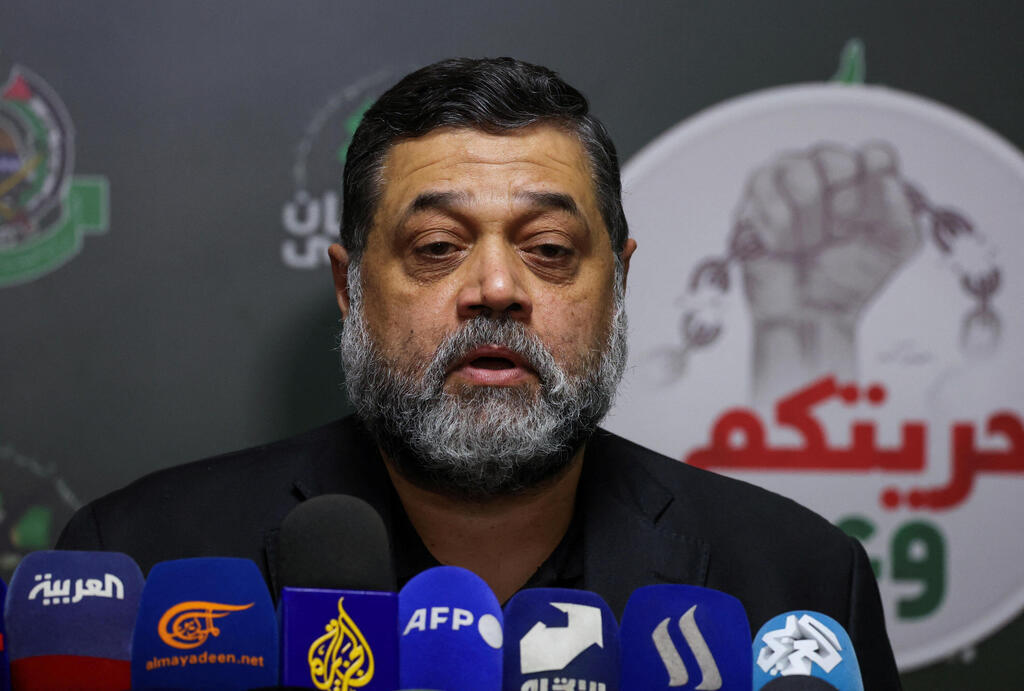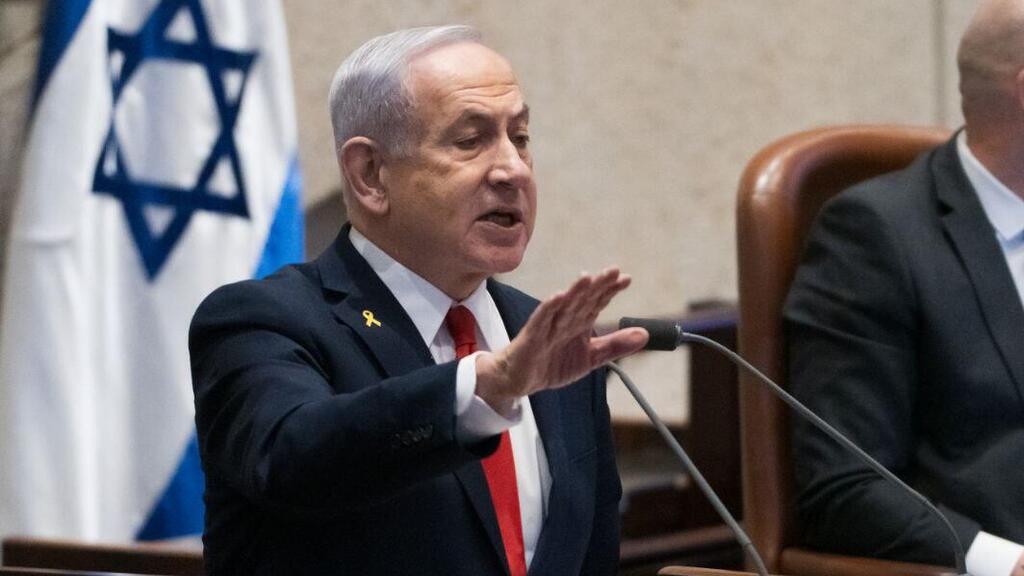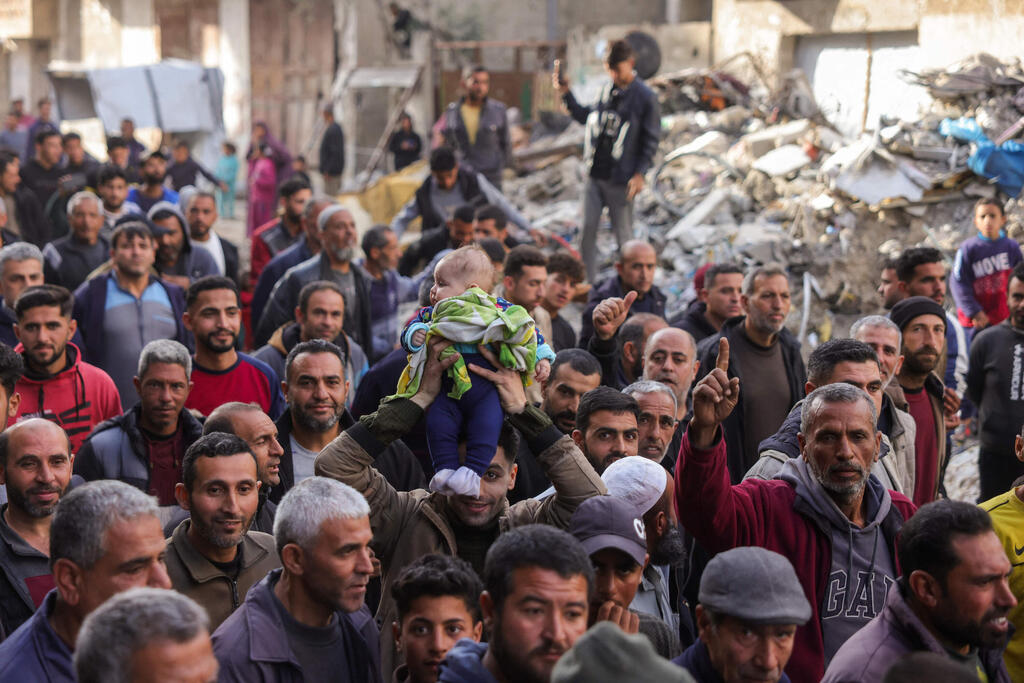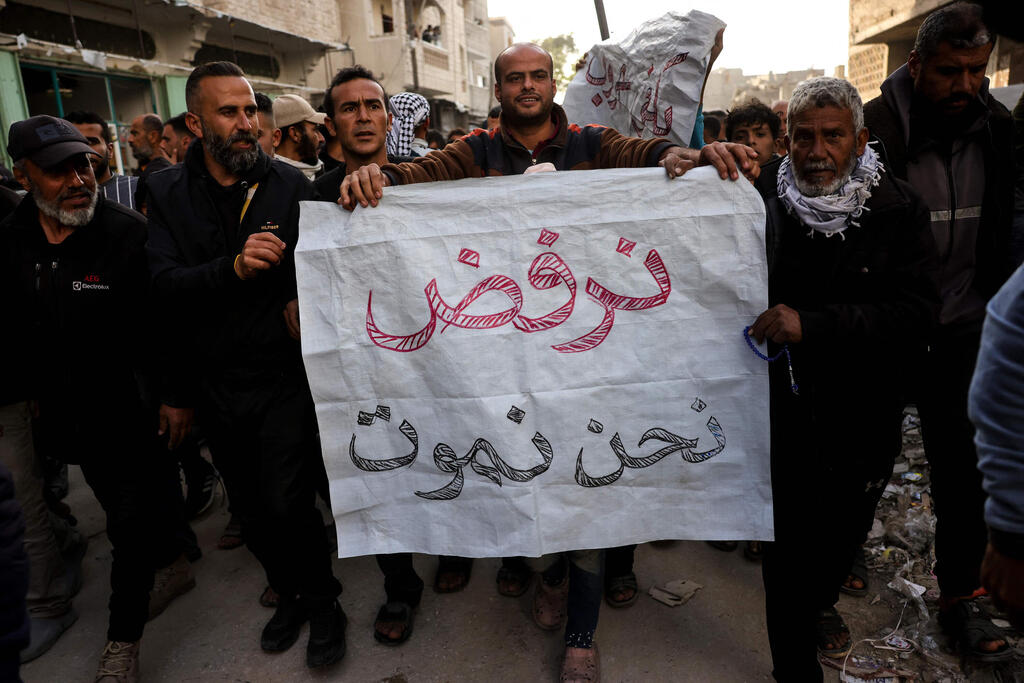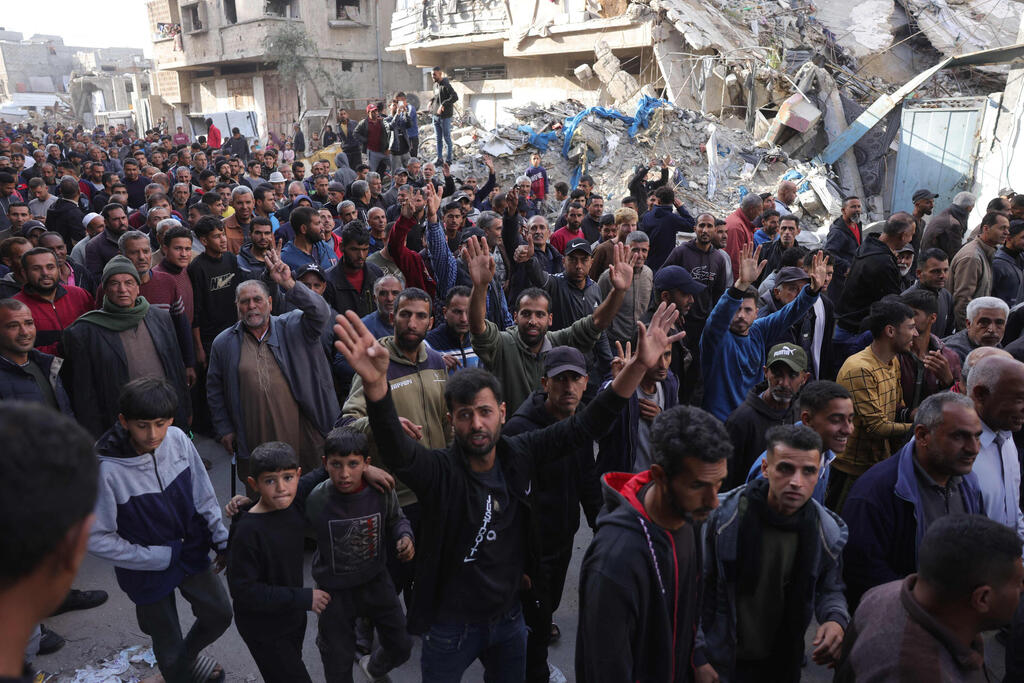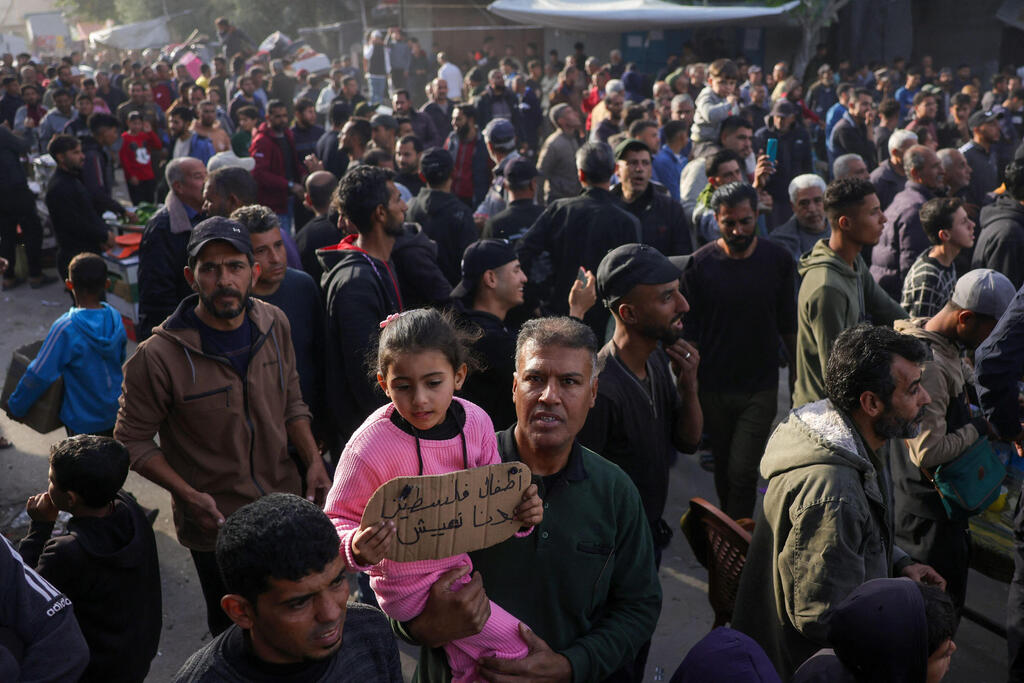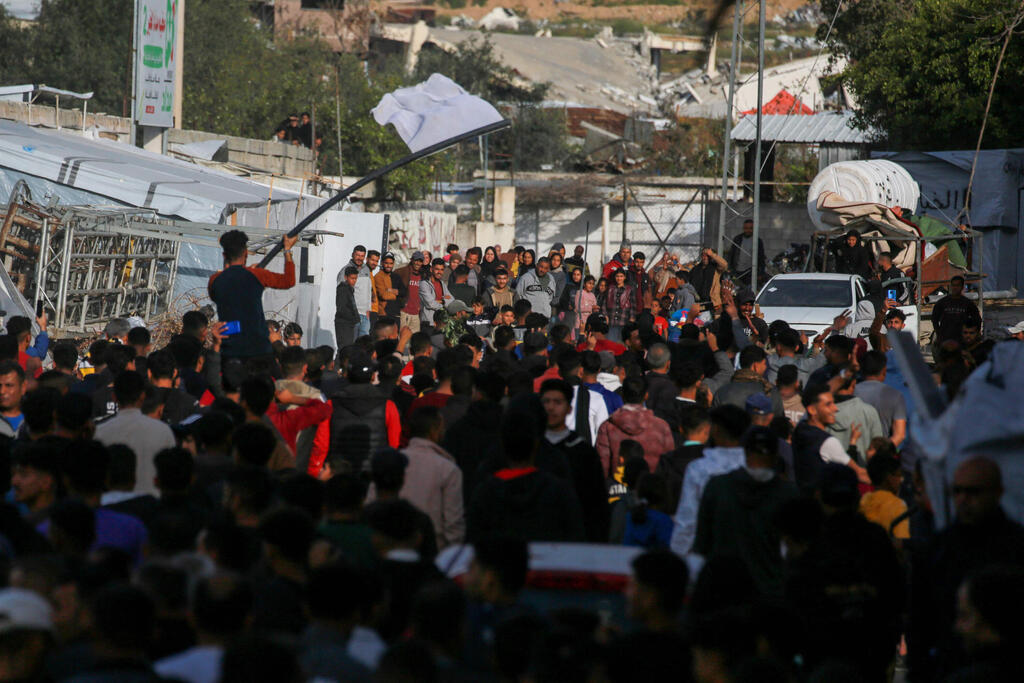Getting your Trinity Audio player ready...
Rare public protests against Hamas resumed Wednesday afternoon in Beit Lahia and the Shijaiyah neighborhood of Gaza City, a day after hundreds of displaced residents in northern Gaza demonstrated against the war and their forced displacement.
Protesters chanted slogans including “Out with Hamas,” as frustration over the ongoing war and deteriorating humanitarian conditions spilled into the streets.
Gazans protest against Hamas in Shijaiyah, Gaza City
Additional protests are reportedly planned in areas with significant Hamas presence, including al-Saraya Square in Gaza City—where Hamas held hostage-release ceremonies—as well as Jabaliya refugee camp and Bani Suheila square in Khan Younis, in southern Gaza.
Hamas has accused Israel of orchestrating the protests, while Prime Minister Benjamin Netanyahu claimed, “The demonstrations show that our policy is working.”
Public opinion among Palestinians appears divided over the protests, which are the largest seen in Gaza since Hamas’ October 7 massacre in Israel. Some support the demonstrations, which demand an end to the war, the reopening of border crossings and the delivery of food, while others oppose them. In a striking development, some protesters have even voiced support for peace with Israel.
Hamas officials have reacted harshly. Senior Hamas figure Osama Hamdan accused Israel of instigating the protests. During Tuesday’s demonstrations, protesters shouted insults at Hamdan, criticizing him for promoting “Palestinian steadfastness” while living abroad.
Another senior Hamas official, Sami Abu Zuhri, dismissed the demonstrators as “mouthpieces for the occupation,” hinting that they had betrayed the Palestinian cause.
On Tuesday, hundreds of residents from Beit Lahia and Beit Hanoun in northern Gaza marched toward Gaza City after being displaced from their homes.
The protest was the first of its kind in Gaza to openly challenge Hamas’ messaging about “steadfastness” and staying rooted in Palestinian territory.
Demonstrators carried signs reading “Our children’s blood is not cheap” and “Stop the war now,” while a group of young men chanted, “Hamas out, Hamas must leave.”
Protesters blamed Hamas for their displacement, saying rockets launched at Israel from nearby areas provoked retaliatory strikes that forced them to flee.
The protest was highly unusual, both in scale and in its bold criticism of Hamas during wartime. Gaza residents have limited avenues to oppose Hamas rule, which is enforced through fear, including public executions of dissenters.
Gazans protesting against the war in Jabaliya, northern Gaza
But the rare public dissent may signal a breakdown of the “barrier of fear” that has long prevented Gazans from expressing opposition to the terrorist group. Hamas forces attempted to disperse the protests to little success.
While Hamas has condemned the protests, senior Fatah officials welcomed them, calling the demonstrations a sign of public resistance against Hamas rule.
Mahmoud al-Habbash, a senior advisor to Palestinian Authority Chairman Mahmoud Abbas, told Saudi Arabia's Al Hadath TV that “the protests in Beit Lahia are a cry from the people of Gaza against Hamas’ policies.” He said the solution lies in returning Gaza to national consensus and the Palestinian Authority.
“We will not accept the uprooting of any Palestinian from Gaza or the West Bank,” Habbash added. “The focus must be on removing Hamas from power in the Gaza Strip. I urge Hamas to listen to the voices of the Palestinian people there—Hamas must respond.”
Prime Minister Netanyahu also addressed the protests in a speech to the Knesset on Wednesday, calling them unprecedented. “In recent days we’ve seen something we’ve never seen before—large, open protests in the Gaza Strip against Hamas rule,” he said.
“We’ve seen many pro-Hamas protests in European capitals, on campuses and in America, but protests like this in Gaza, against Hamas—we haven’t seen that. More and more Gazans are realizing that Hamas brings them nothing but destruction, and that is significant.”
Netanyahu said the demonstrations validate Israel’s strategy: “All of this shows that our policy is working. We are determined to achieve all of the war’s objectives: eliminating Hamas’ military and governing capabilities, returning all our hostages, ensuring Gaza no longer poses a threat to Israel and returning our displaced citizens home safely.”
The prime minister is expected to convene a security meeting on Wednesday evening to discuss the ongoing war in Gaza. Defense Minister Israel Katz and IDF Chief of Staff Eyal Zamir were invited. Notably absent from the list of participants is Shin Bet chief Ronen Bar, whom Netanyahu has sought to dismiss, pending a High Court ruling.
Hisham al-Barawi, the mukhtar (clan leader) of the al-Barawi family in Beit Lahia, issued a rare public call on Hamas to end its rule in the Gaza Strip, saying residents want to live in peace—far from a leadership that has brought only destruction and death.
“We say to our brothers in Hamas—enough, enough, enough,” al-Barawi declared. “Every two or three years, we face another catastrophe, and the whole world turns against us. We are not satisfied with Hamas rule. We are not against Hamas, but we cannot live under their governance. We should not carry weapons—we need to raise white flags before the world and ask them to stand with the Palestinian people. We want to live in peace, not by the gun.”
In contrast, other Beit Lahia community elders—apparently aligned with Hamas—released a statement on Al Jazeera that omitted any mention of protest calls for Hamas' ouster. “We cannot accept the exploitation of spontaneous protests for political purposes during this sensitive stage of the conflict with Israel,” their statement read.
<< Get the Ynetnews app on your smartphone: Google Play: https://bit.ly/4eJ37pE | Apple App Store: https://bit.ly/3ZL7iNv >>
“We stand with the legitimate Palestinian resistance and reject efforts to portray Beit Lahia as estranged from the revolutionary movement. We will not allow fifth-column elements to hijack our people's legitimate demands and distort the national picture.”
Hamza al-Masri, a Gaza-based activist known for his strong opposition to Hamas and followed by thousands online, called on residents to take to the streets. In a message shared via his Telegram channel on Tuesday, he urged: “Put down your phones and go outside. We are tired of injustice. How long will we stay silent while our families and loved ones die before our eyes? Show the real voice of Gaza—stop manipulating us and claiming we stand firm. We hope all the free people of Gaza, especially in Khan Younis, Nuseirat and beyond, will rise up and demand an end to this war.”
The growing criticism appears to be driven by frustration with Hamas decisions that many in Gaza blame for their dire living conditions, ongoing war with Israel and the failure to reach a ceasefire agreement. Calls for more protests continue to grow, with some residents explicitly demanding the terrorist group be ousted from power and expelled from the territory.
Last year, displaced Gazans in central Gaza also held protests calling for an end to the war, chanting slogans critical of Hamas and raising signs reading “Yes to hostage release.”
Even before the October 7 attack, Gazans had staged protests in Jabaliya refugee camp demanding better living conditions, electricity and salaries. In August 2023, several protesters were injured when Hamas security forces violently dispersed large demonstrations across the enclave.







